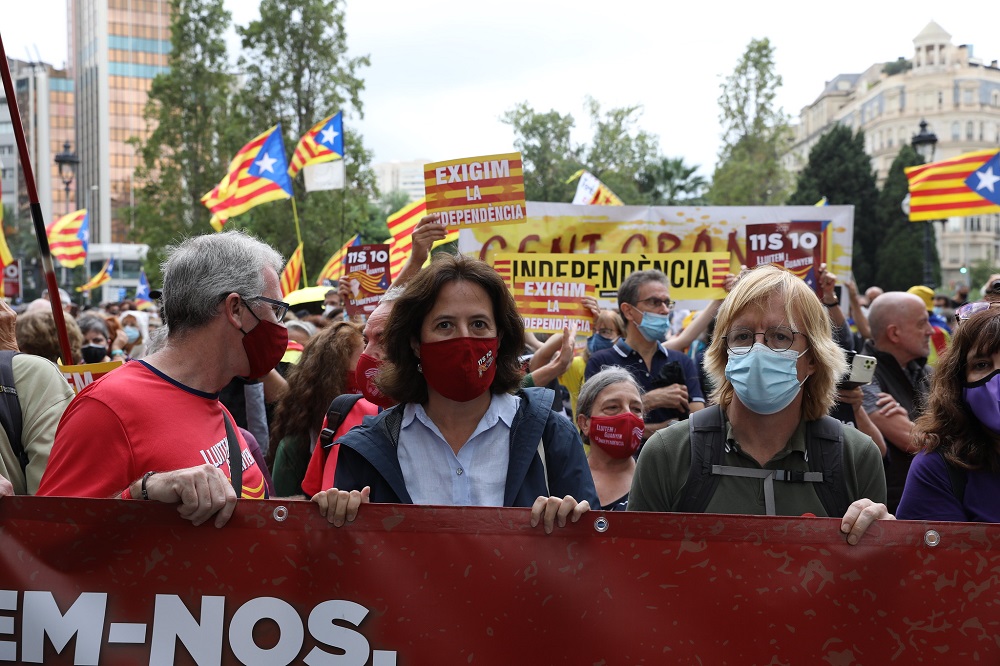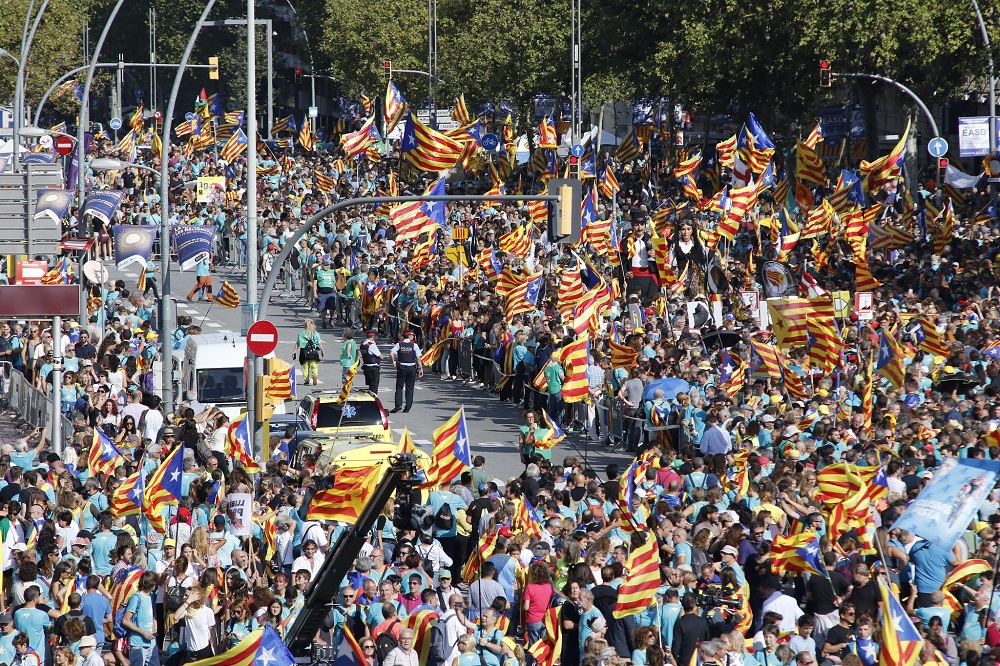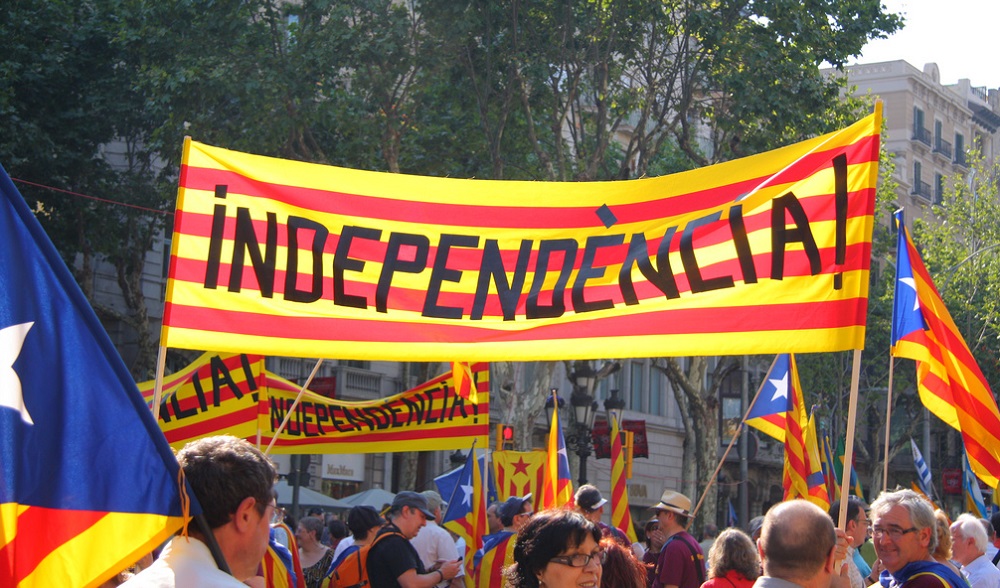With optimism waning, where next for Catalan independence as supporters take to the streets once more?

Luke James
With a referendum just weeks away, more than a million people poured into the streets of Barcelona as supporters of Catalan independence of all political persuasions united in a pre-poll show of strength, hopeful they were on the brink of making history.
The optimism of ‘La Diada’, the Catalan national day celebrated on September 11, of 2017 could hardly seem further away as the 10th annual independence demonstration gets underway today against a backdrop of internal divisions and international crises which have diverted people’s attention towards the cost of living and climate change.
Carles Puigdemont, the president in 2017, remains in exile, the current president, Pere Aragonès, is boycotting the main rally and the protest organisers freely admit people feel “demotivated”.
Even the choice of colour for this year’s official t-shirt reflects the mood: black. There will be no playful themes or stunts as in other years. The message is clear: this year is a protest proper, with the fire as much aimed at political leaders in Barcelona as those in Madrid.

The seemingly epic scale of the events and changes over the last five years are just a microcosm of Catalonia’s history, according to the Wales-based author of a newly-published history of the country.
“The history of Catalonia is a history of rebellion and a history of failed rebellions,” Dr Andrew Dowling of Cardiff University told Nation.Cymru.
“Most national days tend to celebrate victories but in the case of Catalonia, they mark a defeat – the conquest of Barcelona by Spanish and French Bourbon forces in September 1714.
“I wouldn’t want to say that, as a population, they’re doomed to fail, however I was very much of the view that they did not have the ability to achieve independence in 2017.”
The final chapter of Dowling’s concise 184-page history of Catalonia is dedicated to its most recent “failed rebellion”.
Independence leaders made a “major error of interpretation” over Spain’s capability and willingness to use force, he believes, saying: “If you read what independence leaders were saying about Spain until about 2017, they would often say Spain is a failed state, Spain is on the point of collapse.
“Spain isn’t a weak state, it’s a strong state and member state of the European Union. Essentially, they drove their car against a brick wall and the only thing that was damaged really was the car.
“There was some damage done to the reputation of Spain too, I think the police violence clearly became a global news story. People were really shocked that violence was being meted out to people by the police in a member state of the European Union.”
‘Demographic transformation’
But Dowling thinks the most fundamental reason for the failure of the 2017 push for independence is to be found in the book’s earlier chapters on social change.
The academic, who spent seven years living in Barcelona in the 1990s, wanted to move away from the “kings and queens” approach of the existing English-language accounts of Catalonia to write a history that “includes the majority of the Catalan population.” Dowling read When Was Wales by “the people’s remembrancer” Gwyn Alf Williams in preparing his new book.
“The simple answer to that is population change,” he said when asked why Catalan society is split down the middle on independence. “If you were looking at Catalonia in the 1920s, 80% plus of the Catalan population spoke Catalan.
“But from the 1920s and, substantially during the period of the Franco regime, you get a vast demographic transformation of the country. Basically the population doubles and the vast majority of that doubling comes from migrants from other areas of Spain. That’s why the majority language in Barcelona is Spanish and those Spanish speakers have their origin above all in the 1950s and ‘60s.
“1960 is the last time when Catalan is the majority language of the population. So you have to appeal to Spanish speakers as well. Because you have half the population identifying with Spain, you do have the potential for social conflict. I think that needs delicate handling. That wasn’t really reflected on until 2017.”

There has been a shift in strategy towards a more consensual approach since then, with the establishment of a “dialogue table” between the Catalan and Spanish governments in 2020.
That tendency took further hold at last year’s elections when Esquerra Republicana de Catalunya (ERC) became the largest pro-independence party in Catalonia’s parliament on a promise of a negotiated referendum. Their main rivals, Junts per Catalunya, had campaigned for another unilateral referendum.
“You’ve got a great split in the independence movement between those around Esquerra Republicana, who believe, in my view correctly, that the only way to achieve independence is to build a bigger social majority,” said Dowling. “You get a meaningful, clear social majority in Catalonia and then you have the possibility of appealing internationally.
“The other side represented by Junts and Puigdemont, a very factional formation in itself, which says ‘one last push. One last heave. We failed in 2017, if we do the same thing again this time, independence is in the bag’. For me, that’s a completely incorrect reading.”
‘Pantomime’
The dialogue tables produced their first agreements this summer, including a reform of Spain’s sedition law, which was used to imprison independence supporters including Catalan government ministers following the 2017 referendum, and protections for the Catalan language.
There has however been no progress made towards an agreed independence referendum. Although the latest poll shows ERC remains the most popular pro-independence party, there is a growing frustration with their strategy among influential sections of the movement.
The organisers of today’s demonstration, the Catalan National Assembly, have called the dialogue tables a “pantomime” that has produced only “breadcrumbs”. Catalan president Pere Aragonès has responded by accusing them of attacking his party, ERC, more than the Spanish state.
“Esquerra Republicana, in strategic terms, are thinking about ‘how can we grow in the greater Barcelona area, how can we appeal to Spanish speakers’?” added Dowling. “Although they’re heavily criticised on the Twittersphere, Twitter is not reality. I think they’re making the correct analysis in that the only meaningful way of achieving Catalan independence is getting a solid degree of support or acquiescence of that Spanish-speaking in origin population.”
The divisions over Catalonia’s present and future direction can appear tame when compared to the debate over its past and Dowling expects to “get shot from both sides” for his book, the third he has published on Catalonia since 2012.
“It’s deeply divided around the Civil War,” he said. “How people interpret the Spanish Civil War is very much a reflection of how they vote today.
“There’s a strong nationalist narrative about Catalan history, there’s an anti-Catalan narrative, there’s a strong communist or post-communist historical tradition in Catalonia as well. History departments in Catalonia can be very factionalised, as I know.
“It’s very real to people, very important to people, because it feeds into their sense of self in the present.”

‘Memory’
While another meaningful push for independence is unlikely during this decade, Dowling believes, history means the independence movement isn’t going away.
Not the events of 1714, which will be commemorated today, but those in living memory of the people demonstrating on the streets of Barcelona.
“The Francoist persecution of Catalonia is still a very real historical memory that’s transmitted,” he said.
“Essentially, the Franco regime tried to destroy all other languages and cultures that were not Spanish. That was its clear strategic goal. So if you lived in the Basque Country or Galicia or Catalonia, you absolutely experienced that and the memory of that is transmitted across the generations.
“It’s difficult to imagine how people in Wales would feel today if, for at least 20 years, if not longer, the English government had absolutely tried to destroy your language, culture and identity. As late as the 1960s, that was their goal. That’s happened in many people’s memory.
“These issues about claims for independence are not going away, they’re very much lived and real and many Catalans who support independence, or even turned to independence 10 years ago, the majority of them, are still in favour of independence. It’s fallen but surprisingly little.”
Support our Nation today
For the price of a cup of coffee a month you can help us create an independent, not-for-profit, national news service for the people of Wales, by the people of Wales.






Basically the author is saying the problem is people from other parts of Spain migrating into Catalonia. Do you see a resemblance to Cymru and the UK.
In 2017 the Catalonian parliament approved their independence vote, It was then put to their people in a referendum in which my a majority chose independence by a thumping 2,044,038 voting Yes to miniscule 177,547 No. The result was later undemocratically ignored by Spain, Catalonians democratically elected government were regarded as if they were terrorists by Madrid, who fled for their lives to various countries in Europe before being hunted down like criminals. The pariah state of Spain is well versed in stealing soverignty, especially resources such as gold. Just look at the damage done to central & South America’s… Read more »
All the major EU countries and UK, their former partner in suppression, will mutually defend the integrity of their territories by vetoing or refusing membership to any new country formed by secession. What a happy little gang of cronies.
Perhaps there is mileage for Yes Cymru to get good relations with the Catalonian independence movement. A sharing of idea might be very useful.
You do know that referendum was boycotted? Hence the low “no” vote.
Blame the EU…..for backing Spain to the hilt….back in 2017!!